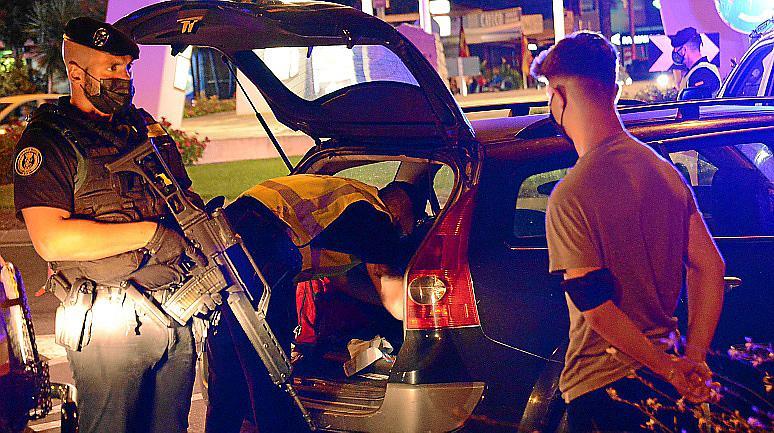The Balearic government and the British Consulate were rolling back the years (two anyway) to when the Foreign Office got down with the kids and sought to ensure - through social media - that they stayed safe while on holiday in Mallorca. Or Magalluf, to be precise. 'Stick With Your Mates' was that 2019 campaign, but now it was back and with added Covid and tourism of excesses legislation, to boot.
Alarm because of the British
Delight there has been in Balearic government circles at green-listing and now double-jabbing, but it has been matched by the alarm at the prospect of British youth descending on Magalluf and seeking to outdo Spanish students in this summer's Euro 2021 competition to crown the champions of excess. Meanwhile, German youth were terrorising Cala Ratjada in a manner to which they have become accustomed over the years but without somehow managing to attract quite the same level of attention as their Arenal counterparts or, and more to the point of last week's government-consulate gathering, the British Magalluf squad.
Outdoor mask-wearing
Sticking with your mates was all very well, but it raised a question as to how close a mate should be stuck to. Spain's health minister, when insisting that curfews weren't back on the table, took the opportunity to remind everyone that masks were in fact still obligatory outdoors in situations where 1.5 metres social distancing can't be guaranteed.
It is admittedly the case that everyone seems to have forgotten (ignored) this, so mates on Punta Ballena can hardly be blamed for neglecting the rule as well, while 'Stick With Your Mates and wear a mask outdoors if less than 1.5 metres from your mates' wouldn't have quite the same ring to it.
Restrictions that weren't that restrictive
The government's alarm meant that it had to rush in "restrictions". For some reason, this became conveyed as restrictions for Mallorca, when they were only for that part of Magalluf (and Sant Antoni in Ibiza) to have been specified under the tourism of excesses law. Moreover, the restrictions weren't particularly restrictive and were the same as those already applied to parts of Arenal and Playa de Palma. They basically boiled down to reducing capacities indoors and outdoors by fifty people.
Curfews that weren't
Certain regions were all for bringing the curfew back. Tourist "hotspots" in Spain, we were informed, were pressing for a reintroduction, they - like Valencia (Benidorm and all) - having been transformed into Covid hotspots in the space of only two or three weeks. Rather like the Balearics, therefore, where a curfew wasn't on the agenda.
In the absence of a curfew, the Balearic tourism minister, Iago Negueruela, was appealing for responsibility, which is about all that ministers seem able to do. Could young people please be responsible and not take part in botellón street gatherings. This was the thrust of his message, one that was being reinforced by the police putting up roadblocks at the Son Castelló industrial estate entry roads.
Banning the sale of alcohol
The government, meanwhile, came up with another restriction that wasn't much of a restriction. In a bid to curb the botellón parties, the sale of alcohol in shops and petrol stations is now banned after 10pm. So, if you're intent on having a botellón, you can go and load up the boot of the car with beer and vodka at 9.30pm. Can you not? There again, if the shop happens to be in a zone covered by the tourism of excesses law, it's banned from selling alcohol after 9.30pm. Make it nine o'clock then.


No comments
To be able to write a comment, you have to be registered and logged in
Currently there are no comments.